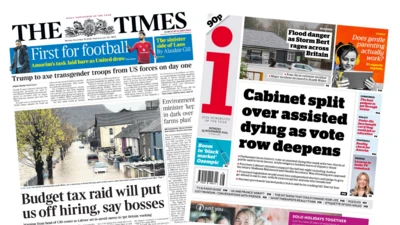We've updated our Privacy and Cookies Policy
We've made some important changes to our Privacy and Cookies Policy and we want you to know what this means for you and your data.
Obama will not ban home repossessions 'fraud'
The White House has ruled out a temporary ban on the repossession of homes, despite a growing row over alleged malpractice.
Some US banks have already imposed their own moratorium on foreclosures while they investigate possible legal flaws in the eviction process.
Amid claims that shoddy paperwork led to wrongful repossessions, calls have grown for a nationwide moratorium.
But a White House spokesman said this could have "unintended consequences".
Last week, Bank of America said it would extend its ban on sales of repossessed homes from 23 US states to all 50.
JPMorgan Chase and Ally GMAC Mortgage have suspended foreclosures in 23 states.
At issue are claims that foreclosure documents were signed off without proper checks and people were wrongly evicted.
BoA is looking into whether homes were repossessed by so-called "robo-signers" and other automated processes, whereby mortgage company employees or their lawyers do not thoroughly verify the information in them.
'Mismanagement'
With banks expected to take over a record 1.2 million homes this year, up from about one million last year, according to the real estate data company RealtyTrac, the foreclosure issue is a hot political potato.
"American families should not have to worry about losing their homes to sloppy bureaucratic mismanagement or fraud," said Senate Banking Committee chairman Christopher Dodd last week.
He also announced that the committee would hold a hearing next month to look into mortgage servicing and foreclosure processing.
However, on Tuesday White House spokesman Robert Gibbs said that a temporary ban could have an unforeseen impact on the ailing US housing market.
"There are a series of unintended consequences to a broader moratorium," he said. President Barack Obama's administration was determined to "get to the bottom of" a problem of hasty foreclosures.
But Mr Gibbs added: "We want to take the just and necessary steps to ensure that the process is being followed legally. At the same time, we don't want to see broader harm done to the housing market and to the housing recovery."
Critics of a moratorium have warned that it could penalise pension funds, insurance companies and other investors, making new loans more expensive.
Investors seeking to recover bad loans might be prevented from doing so, critics argue.
Tim Ryan, chief executive of the US Securities Industry and Financial Markets Association said on Monday: "It is imperative... that care be taken in addressing these issues to ensure that no unnecessary damage is done to an already weak housing market and, in turn, that there is not further negative impact on the economy."
Top Stories
More to explore
Most read
Content is not available








